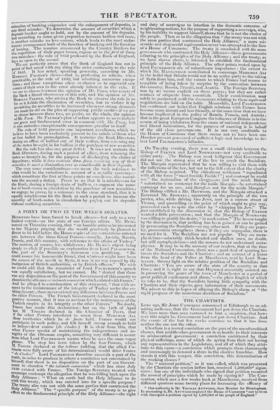A POIN1 OR TWO IN THE WEEK'S DEBATES.
MixisTnns have been forced to break silence—but only to a very limited extent—on the state of our Foreign afthirs. Mr. Hem n moved on Thursday evening, that "an humble address be presented to her Majesty praying that she would graciously be pleased to direct to be laid before the House copica of any conventions entered into between the three Great Powers—namely, Austria, Russia, Prussia, and this country, with reference to the :Milks of Turkey." The motion, of' course, was withdrawn ; Mr. 14 at ifs object being simply to elicit if possible an explanation from Lord Pa LNIERSTON.
One part of the Secretary's statement V.'aS gratifying. " He could assure his honourable friend, t hat whatevc r might have been the causes of the revolt in Syria, it was in no way caused by the instigation of British authorities, or by British officers." We wish we could add that the remainder of' Lord PALMERSTON'S speech was equally satisfactory, but we cannot. lie " denied that there was any disposition on the part of the Government of this country to abandon the alliance or intimate connexion which existed with France." And he alleged in corroboration of this statement, " that with respect to the maintenance of' the integrity of Turkey under the existing dynasty, there never existed any difference between France and the other Powers. The French Government declared in the most positive manner, that it was as anxious for the maintenance of the Turkish empire in its integrity as the other Powers." No doubt, France has made this declaration ; but on the 14th of April last, M. 'Flumes declared in the Chamber of Peers, that if the other Powers interfered to wrest from MEHEMET ALL those territories which he de Pei° held, France would not participate in such policy, and felt herself strong enough to hold an independent course (de s'isoler.) It is clear from this, that when France speaks of maintaining the independence and integrity of the Ottoman empire, something very different is meant from what Lord PAIMERSTON means when he uses the same vague phrase. The step has been taken by the four Powers, which M. TIMERS declared at the tribune (adding, that the allied Cabinets were fully aware of his determination) would drive France "de s'isoler." Lord PALMERSTON therefore conceals a part of the truth, in order to produce in others a conviction not entertained by himself, that there is no disposition on the part of our Government to abandon " the intimate connexion" which has since July 1830 existed with France. The Foreign Secretary treated with sovereign contempt the allegation that he was falling back upon the Holy Alliance : " What on earth had the holy Alliance to do with this treaty, which was entered into for a specific purpose ? The treaty also was not with the same parties that contracted the Holy Alliance." The "specific purpose" of the treaty is to give effect to the fundamental principle of the Holy Alliance—the right and duty of sovereigns to interfere in the domestic concerns of neighbouring nations, for the purpose of supporting a sovereign, who, by his inability to support himself, shows that he is not the choice of the people. Then as to the allegation that "the treaty was not with the same parties that contracted the holy Alliance," a more miserable and disgraceful equivocation never was attempted in the face of a House of Commons. The treaty is concluded with the same governments who contracted the Holy Alliance—these governments adhering to the principles of the Holy Alliance ; and the treaty, as we have shown above, is intended to establish the fundamental principle of the Holy Alliance. The other points rested upon by Lord PALMERSTON are of subordinate importance : the extent to which Mr. M AN onvim.0 contributed to encourage INIEHEMET ALI in the belief that Britain would not be an active party to the taking of Syria from him, and the extent to which France had reason to complain of being taken by surprise by the convention between this country, Russia, Prussia, and Austria. The Foreign Secretary was by no means explicit on these points; but they are rather matters of etiquette than essentials. Their consideration may safely be postponed until the documents relating to these equivocal negotiations are laid on the table. Meanwhile, Lord PALMERSTON has confirmed our belief that English relations with France have become more distant and less friendly, at the same time that we have become implicated in the policy Of Russia, Prussia, and Austria; that in the great European Congress the influence of Britain is in the course of being withdrawn from the cause of national independence and liberal institutions, for the purpose of exerting it in behalf of the old close governments. It is not very creditable to the House of Commons that there seems not to have been one Member present possessed of sufficient logic and knowledge to detect Lord PALMERSTON'S fallacies.


























 Previous page
Previous page